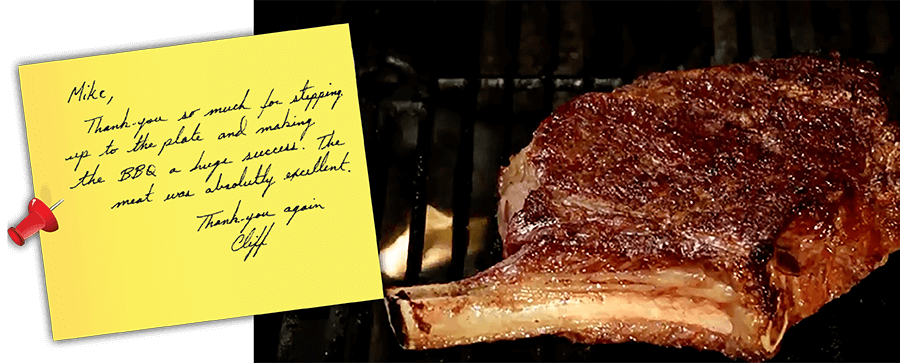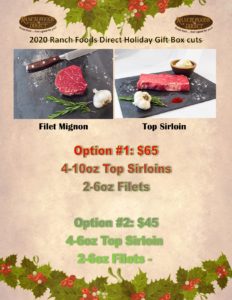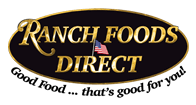

FREQUENTLY ASKED QUESTIONS
Do you have cooking recommendations?
Check out our handy cooking guides that will help make your meal a success.
Questions about Freezing Food? Check out this guide.
Is your cattle fed GMO seed?
We do the best we can to avoid GMOs, but we can’t guarantee our cattle have never consumed GMOs. Unfortunately, the pollen blows around and there are just too many acres of GMO crops planted. We hope that with enough pressure against GMOs and support for our kind of agriculture, the problem will be corrected.
Our position on GMOs are stated in the following:
Are you able to process and prepare game meat?
Unfortunately not. Because we are a USDA facility, we are unable to process for the public. But we do have buffalo and elk available for puchase.
Do you have sides available all year or is there a “harvesting” season?
Our Cowpool program is available year-round. You can order any size from 1/16th of a cow up to a whole cow.
Please visit Cowpool.org for more information.
Do you accept SNAP/ EBT?
In the store, we do. We also accept cash, check, Visa, American Express, MasterCard & Discover. You can also purchase gift certificates in our store in any amount that you’d like.
Online we accept Visa, American Express, MasterCard & Discover.
Why do you use a feed lot?
Unlike very large feedlots that are run by huge multinational conglomerates, ours is relatively small and carefully managed. With adequate space, clean water and healthy natural feed rations, feedlots can actually be a very good environment for cattle. Our cattle have plenty of space to lay down and move around. We don’t feed sub-therapeutic antibiotics or use artificial growth hormones, but we do separate off and treat individual cattle if they get sick. We take pride in our ranch, our feed yard and our store; every step in the production process.
Why do you slaughter your cattle when they are only one-year-old?
Younger animals are more tender with less connective tissue in the carcass. This improves the tenderness and the overall quality of our steaks, roasts and burgers.
What is marbling and why is it so important?
Marbling refers to the inter-muscular fat that appears as white seams or swirls in a steak or a roast. This fat is nature’s way of making muscle cuts tender, flavorful and juicy. Less inter-muscular fat makes meat drier. Some consumers prefer leaner cuts because they want to avoid dietary fat. Natural fats contain many of the most essential nutrients and lead to a satiated feeling. You might be surprised to learn about the high value of natural fats. For more about the dangers of low-fat diets and the benefits of consuming natural fats and oils we recommend you visit the Weston A. Price Foundation.
What do you feed your cattle?
Calves spend the first several months of their lives with their mama cows on grass pastures. After weaning, they are fed a high-energy ration of natural corn, barley, and sorghum for approximately 180-220 days before processing because we believe it makes the meat more tender and flavorful. We always buy the freshest, most local ingredients available for our stringent feeding program while following all generally accepted sustainable and humane practices. No synthetic growth hormones are used, and no continuous-fed sub-therapeutic antibiotics (which can cause bacterial resistance in human medicine) and no animal by-products are used in our feeding program.
Visit Callicrate Cattle Co. for more information.
Is your meat healthier than other meats?
For one thing, our meat isn’t raised with any continuously fed antibiotics or artificial growth hormones. The production process is slower, cleaner and more carefully monitored than you would ever see in high-speed packing plants. To learn more about the modern meat industry, we recommend the book, Fast Food Nation, by Eric Schlosser. It will help you understand how the meat industry is changing and why small, local companies often provide a better quality, more wholesome alternative.
We ensure that all of our suppliers follow the same animal-friendly, no hormones or antibiotics protocols that we value so much.
Is your beef grass fed?
All of our cattle start out on grass pastures. The term “range fed” or “grass fed” typically refers to cattle that remain on grass for their entire lives and are never fed grain at a feed bunk. We do feed our calves grain for approximately 180-220 days before processing because we believe it makes the meat more tender and flavorful. For this purpose, we maintain a small family-owned well-managed feeding facility with lots of open space. Visit Callicrate Cattle Co. http://www.callicratecattleco.com
For more information, read this article written by Mike Callicrate: Pastured Animals Deserve Good Care and Good Nutrition
Is your beef different than Coleman or other natural beef brands?
Our naturally tender beef is unique from any other branded product. To get the unique benefits and the consistency of our product, you can’t substitute it with anything else.
Coleman is among several large natural beef companies. One thing unique about Ranch Foods Direct is that we are not associated with any other gigantic food processor like Swift/ConAgra, Cargill or Tyson. We are one of the very few successful value-added beef producers who can say that. Why is that important?
It means more of the profits go back to family farmers and ranchers rather than into the coffers of very large multinational corporations. Another thing that makes our product so unique is our processing system. Despite the improvements in quality and food safety, the technique is too slow for the big packing plants that literally slaughter up to 400 head of cattle in a single hour. We process less than 400 cattle in a week! While it might have a fancy label, natural beef from the big packing companies only differs slightly from commodity beef and is often produced in the same large processing plants. Some of the largest companies in the world are producing so-called organic foods in large confinement livestock facilities.
Do your research
Terms like “organic” and “natural” have fairly liberal definitions and could be used for something far less specific than what you expect.
Do you slaughter, or butcher, your own meat?
When we came to Colorado Springs, we formed a joint-venture with G&C Packing Co., a family business that has been in the community since 1944. We believe in working together with other small family-operated businesses to process and distribute our products and bring more economic vitality to local communities. After the initial processing at these carefully selected plants, we receive the carcasses and hand-cut them into smaller pieces and vacuum-pack convenient portions right here in our meat shop. Because of our small size and low volume, everything we do involves the greatest care and attention to detail. And, yes we do slaughter our own meat at Callicrate Cattle Co. with the Mobile Meat Processing Unit.
Why does your meat taste so much better than other meats?
Ranch Foods Direct is in a class of its own. National meat packers, processors and distributors commonly use a process called Advanced Meat Recovery (AMR) to cheapen their ground beef. It involves mechanically recovering all possible residual meat from the bones. USDA tests found that 35 percent of AMR-containing samples included brain and spinal tissue, which is associated with the potential to transmit mad cow disease to humans. RFD never uses any form of AMR. Our hamburger is just wholesome, all-natural, high quality ground beef.
Do you feed your cows corn?
Yes, we do feed corn. We feed corn and forages grown on the same land that the manure from our cattle fertilizes, creating a symbiotic relationship between plants, animals and people.
Just like in humans, the food they consume does affect their digestive system. Cattle are uniquely designed to digest roughage, high cellulose materials like grass, that humans are unable to digest. This is the real gift of the ruminant animals like cattle, sheep and goats. These animals can turn something useless to humans, like grass and other low quality forages, into high quality nutrition: meat and dairy products.
I suggested to my friend Michael Pollan that in his book, The Omnivore’s Dilemma, he made corn out to be a bigger evil than it actually is. Fed properly, corn — like barley, oats and other cereal grains — can be a very important part of a balanced diet for ruminant animals. You may have heard of the highly regarded animal behavioral expert Temple Grandin. Last summer, I was discussing Michael Pollan’s book and the feeding of corn to cattle with Temple over lunch. She exclaimed that cattle love corn and that there is a place for corn in cattle diets. I agreed, and responded that men love whiskey, too, but too much will kill them. Michael Pollan is now acknowledging the importance of combining plant and animal agriculture on family farms as opposed to the destructive monoculture approach of industrial farms.
Unfortunately, in the big industrial system of beef production, so much corn is fed that huge amounts of antibiotics and rumen buffers are required to address the high acidity and life threatening bloat problems it causes. And yes, this unnaturally high acid environment is conducive to the growth of harmful bacteria. Corn is cheap, because it is highly subsidized, leading to its overuse.
The cattle that produce our Callicrate Beef are raised on grass at St. Francis, Kansas, until they are weaned from their mothers at about six months of age. Then they are fed a healthy diet of natural forages and grain, requiring no antibiotics, until they are ready for market. This traditional method of beef production provides for the best possible quality of life for the animals in our climate, which is limited to a 120-day growing season, and the best possible year-round meat quality, while constantly improving our soils with valuable manure from our animals.
As with all of our customers, you are welcome to visit our cattle operation in St. Francis, 200 miles northeast of Colorado Springs. We are currently in the midst of our annual spring calving season.
One more note: the award I received was presented by the American Corn Growers Association, not to be confused with the more politically prominent National Corn Growers Association. The American Corn Growers supports traditional family farm agriculture and rural communities while the other outfit backs big industrial agriculture, globalization, biotechnology and large concentrated animal feeding operations, all things I personally oppose.
Is it true that you sued the meat packing industry?
Mike Callicrate was part of a contingent of 10 independent cattle producers who sued the largest meatpacking company in the world, IBP Inc., now part of Tyson Foods, for anti-competitive marketing practices in 1996. The cattlemen accused the meat packer of using captive supply arrangements with selected suppliers to undermine the prices paid for live cattle. That case is still in the courts. Although a jury ruled in favor of the cattlemen in February of 2004, the judge threw out the jury’s verdict, sending it to appeal. For more about this case and other related issues, visit the Cattlemen’s Legal Fund.
Is the slaughtering method humane?
We treat our cattle with respect and honor them for the food they provide. Instead of slaughtering 400 cattle in an hour, our local plant only processes 80-100 cattle in a day. Think about the difference. It is a slower-paced, more humane process, which is very important to us. For more information please visit MobileMeatProcessing.com.
Holiday Gift Boxes


ORDER PICKUP BY USING FORM BELOW
Please use the below form to email your order into us. Choose Option #1 - or - Option #2 from the options in the photo above.
Please also designate pickup location in your order.
We will reply to confirm your order is received. You will receive an invoice once your box(es) are filled, weighed and ready for pickup - you will pay upon pickup.
Thank you for choosing Ranch Foods Direct for your holiday gift needs.
TOWN CENTER STORE:
4635 Town Center Dr, Colorado Springs, CO 80916
Open MON-FRI 8AM-6PM & SAT from 8AM-5PM - CLOSED SUNDAY
FILLMORE STORE:
1228 E Fillmore St, Colorado Springs, CO 80907
Open MON-FRI 8AM-7PM & SAT from 8AM-6PM - CLOSED SUNDAY
